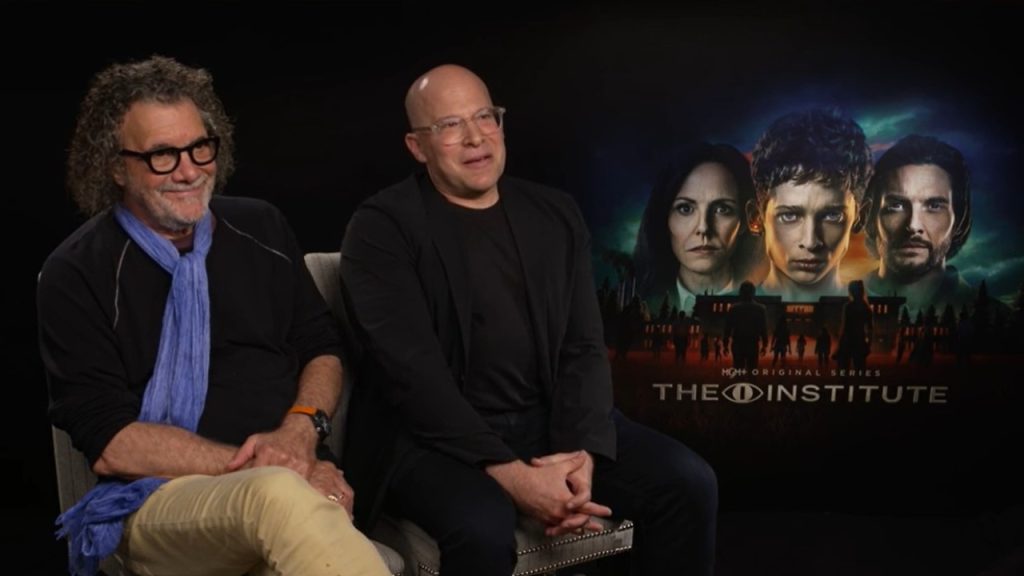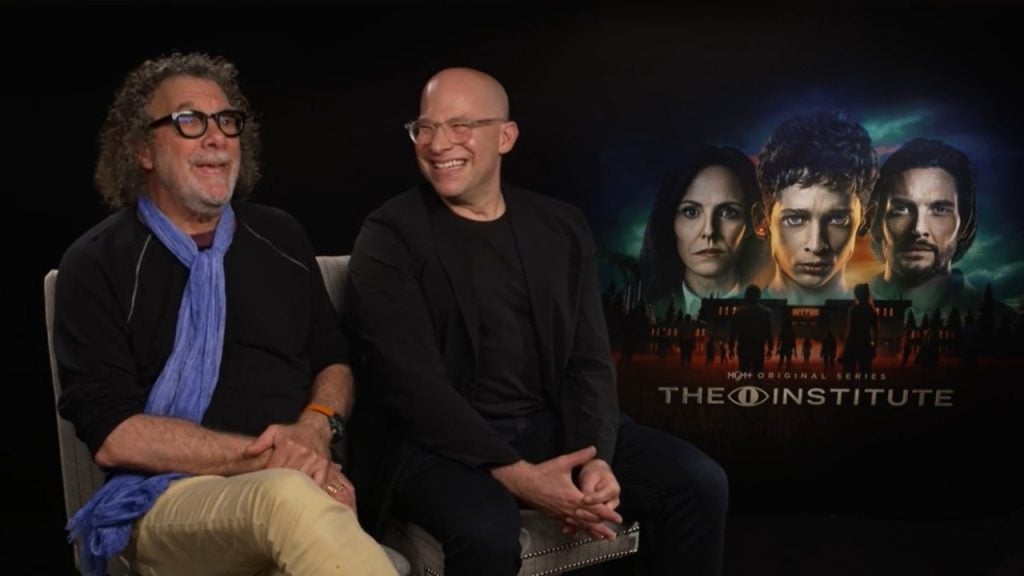Adapting Stephen King’s work always entails significant risks. The fans will undoubtedly have expectations of the film or series, and as a director or series producer, you want to honour the “King of Horror” in the best way possible. Jack Bender (Lost) and Benjamin Cavell (Justified) took on that challenging task for their latest project, The Institute. The series, co-produced by both, is co-written by Cavell and co-directed by Bender. It follows Luke Ellis (Joe Freeman), a teenager who is abducted and taken to a secret facility called The Institute due to his unique abilities. When he meets kids with similar powers to him, he decides to stand up to The Institute’s head, Ms Sigsby (Mary-Louise Parker), and try to fight back. This results in a series that wonderfully balances aspects of different genres, including sci-fi and horror.
Ahead of the series release on MGM+ on the 13th of July, Geek Vibes Nation sat down with Bender and Cavill to talk about the complex casting process, what it’s like to have King endorsing your project and more.
Geek Vibes Nation: Congratulations on The Institute. What was it about this particular Stephen King novel that made you want to turn it into a series?
Jack Bender: Well, I love working with kids and teenagers. While it’s difficult at times because you have to get the right cast to make it believable, I love it. The kids and their suffering was also something that I’ve seen in one of the school shootings we had in America. It was at Parkland High School. I saw how these kids, after suffering through that nightmare, coalesced into a powerful group that started standing up for themselves. They were seniors in high school. They were saying to the adults and the NRA and all the people they were fighting against, “Get out of our way. We can fix this. It’s our lives. You screwed up.”
It’s like that phrase,’ the meek shall inherit the earth’. I thought to myself, children shall inherit the world, but first, they have to save themselves. Once Ben and I came together for this work, we completely agreed that it ultimately had to be about kids saving themselves.
Benjamin Cavell: That was what attracted me as well. I also love this King’s work, which focuses on human monsters as opposed to the more supernatural monsters that originate from other dimensions. It also explored the incredible theme of children coming together to save themselves. There isn’t some grown-up action hero who hears about kids being victimised and then rides to the rescue. It’s really about the kids having to bond together and figure out what they’re good at, what they can do, and come up with their kind of great escape plan to get out of this. That was incredibly compelling to me.
The Parkland kids and the school shootings are something that we still deal with in the United States that, thank God, you guys [the interview was conducted in London] don’t have to deal with in the same way. Every political party, certainly in the United States, but in every country, is always talking about how they’re doing it for the kids, whatever they’re doing or justifying. It’s always for the kids and their future. And yet, almost none of them ever really consult the kids. It felt like we had an opportunity to do that with this book. That’s one of the brilliant things about Stephen’s book.
JB: Also, I just want to say, as in terms of Ben Barnes’s character Tim and his wounds, that’s something Benjamin, as our head writer, and our illustrious writing team, came up with and pitched. Tim’s saving himself first from the wound he’s experiencing, and that has let him into that small town. We wanted Tim to be close to The Institute so that we could focus more on him as well. The writing team came up with numerous great pitches, and Stephen ultimately said, “Yeah, that’s a good idea.” Stephen has been wildly supportive and loved every script and every episode that we’ve done. He’s a big fan of the show.

You sent him a few episodes first, and then he came on board. Is that true?
JB: Well, I sent him the first episode and a promo reel, and he went, “Oh, my God, this is so great.” After reading a couple of scripts, he said, “I love this. I love the kids.” The fact that they’re a little older in the book, except for Avery, the youngest, who’s the same age. It’s great. He just loved what we were up to, which is incredibly gratifying.
BC: King always has the option of taking an executive producer credit on a show, but he rarely does it. He only does it when he genuinely wants to endorse the product. And that has been gratifying because he also cares deeply about this book, in part because of the kids and what it says about them. He writes wonderfully about kids and teenagers, and having him agree to be an executive producer on this and endorse what we had done was endlessly gratifying.
As you already mentioned, the kids play a significant role in this series. How did the casting process go for the roles, and then how did you eventually end up with Joe Freeman, who is amazing?
JB: He’s amazing. I want to give credit to Seth Yanklewitz, who connected us. He was the head of casting for MGM+. We were looking for the kid and not finding him because he had to be the linchpin. He had to be the one who made us believe him and care about his character; otherwise, the show would not have its centre, no matter how brilliant the show is.
Seth connected us to a wonderful casting director. We found Joe during our first round of kids casting in London. He had never acted before. This is his first experience. From the moment we saw that tape, we went, “Wow, that’s the kid”. I loved working with him. While he was tall, he possessed a youthful quality that ensured the character was the age we needed him to be. Joe was an exceptional find.
For the rest of the kids around him, we wanted to feel like we were eavesdropping on real kids. We wanted it to be real kids. Some of the actors we cast had never acted before, while others were theatre actors, and a few weren’t. I’m proud of our cast, as they deliver credible and authentic performances.
BC: I agree. Jack and I were saying to each other from the very beginning of this, “Where are we going to find these kids? And especially, where are we going to find Luke?” Just because, based on the book, you’re going to have to ask so much of this kid. He had to portray all these different emotions and endure so much, and he needed to be the linchpin of the series. That was our concern. Our overarching concern when we developed this and wrote the pilot was, ‘Where are we going to find this kid?’ As soon as we saw Joe’s audition tape, it was like, “Yes, we found him.”
JB: And he’s surrounded by a great cast. For example, Mary-Louise Parker is our villain. She can manipulate you, charm you, and be brilliant. I’ve worked with her on Mr. Mercedes, and we loved working together. I’ve described her at times as a thoroughbred. She’ll give you on-screen moments that are so unexpected without being over the top. The moments are grounded but are out of the box enough. She’s exceptional at finding believability in the world of eccentricity and does deliver that. You believe her and hate her, and we’re allowed to harbour those feelings.
And Ben Barnes, in a different way, carries that wounded quality without being self-pitying at all and gives a wounded yet strong performance. He’s out there to do a good job as a nightknocker. Whoever heard of that job, which I think Stephen King invented.
The Institute is out on the 13th of July on MGM+







